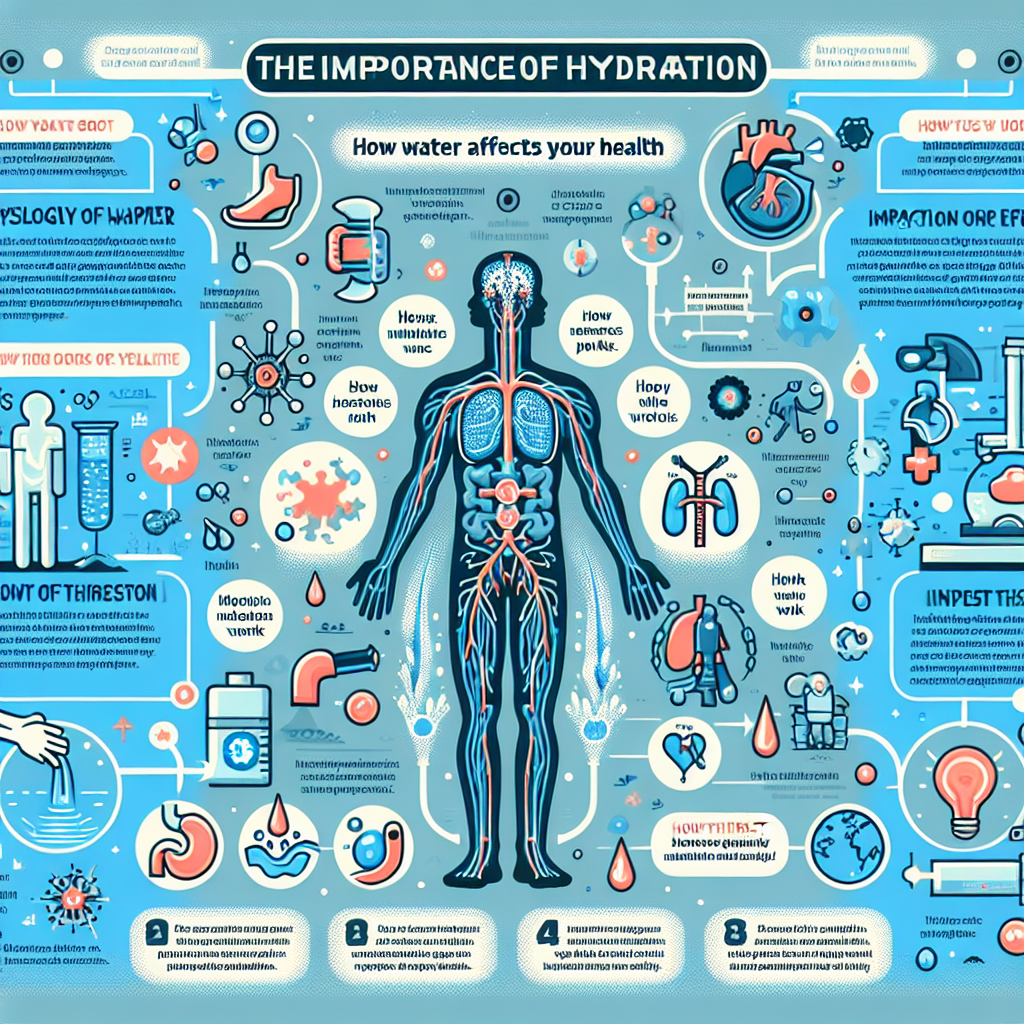The Importance of Hydration: How Water Affects Your Health

Discover the importance of hydration and how water affects your health. Learn more about the vital role water plays in your overall well-being. Don’t wait, start your journey to a healthier lifestyle today. Click here to find out more.
Understanding the Role of Hydration in Maintaining Optimal Health
Water, the most abundant and essential element on earth, plays a crucial role in our overall health and well-being. It is a vital component of every cell in our body, and it is involved in nearly every bodily function. From regulating body temperature to aiding digestion, water is indispensable to our survival. Understanding the role of hydration in maintaining optimal health is therefore of paramount importance.
Hydration is not merely about quenching thirst. It is about maintaining fluid balance in the body. Our bodies are approximately 60% water, and this ratio needs to be maintained for optimal functioning. Water is lost through various means such as sweating, breathing, and excreting waste, and it needs to be replenished regularly. Dehydration, or the lack of adequate water in the body, can lead to numerous health problems ranging from mild headaches and fatigue to severe conditions like heat stroke.
One of the primary roles of water in the body is to regulate body temperature. When we exercise or are exposed to heat, our bodies cool down by sweating. If we do not replenish the water lost through sweating, it can lead to heat exhaustion or even heat stroke. Moreover, water acts as a lubricant for our joints and muscles, reducing the risk of cramps and sprains.
Water also plays a crucial role in digestion. It aids in the breakdown of food and the absorption of nutrients in the digestive tract. Without sufficient water, digestion can become slow and difficult, leading to constipation. Additionally, water is essential for flushing out toxins and waste products from the body. By promoting kidney function, it helps in the elimination of waste through urine.
Hydration also impacts our cognitive function and mood. Studies have shown that even mild dehydration can impair memory, attention, and motor skills. It can also lead to mood changes and increased feelings of anxiety and fatigue. On the other hand, staying hydrated can boost concentration and productivity.
Furthermore, water is essential for maintaining skin health. It helps to moisturize the skin, keep it supple, and enhance its elasticity. Dehydration can lead to dry, flaky skin and accelerate the appearance of wrinkles and fine lines.
Despite the importance of hydration, many people do not consume enough water daily. The common recommendation is to drink at least eight 8-ounce glasses of water a day, which equals about 2 liters, or half a gallon. However, individual needs may vary depending on factors such as age, sex, weight, physical activity level, and overall health.
In conclusion, water is a vital nutrient that plays a pivotal role in maintaining optimal health. It regulates body temperature, aids digestion, supports cognitive function, and promotes skin health, among other functions. Therefore, it is essential to stay adequately hydrated by consuming enough water daily. Remember, your body depends on water to survive. Every cell, tissue, and organ in your body needs water to work properly. So, make hydration a priority and reap the numerous health benefits that water offers.
The Impact of Water Intake on Physical and Mental Well-being

Water, the most abundant and essential element on earth, plays a crucial role in our overall health and well-being. It is a vital component of our bodies, making up about 60% of our body weight. The importance of hydration cannot be overstated, as it affects every aspect of our physical and mental health.
The impact of water intake on physical well-being is profound. Water aids in digestion, absorption, circulation, creation of saliva, transportation of nutrients, and maintenance of body temperature. When we are properly hydrated, our bodies can perform these functions efficiently, leading to improved physical health. For instance, water helps to flush out toxins from our bodies, reducing the risk of urinary tract infections and kidney stones. It also keeps our skin looking healthy and youthful by maintaining its elasticity and replenishing skin tissues.
Moreover, staying hydrated is essential for maintaining energy levels and physical performance. During physical activity, our bodies lose water through sweat. If this lost water is not replaced, it can lead to dehydration, which can cause fatigue, muscle cramps, dizziness, and more severe health problems. Therefore, athletes and those who engage in regular physical activity should ensure they are consuming enough water to replace what is lost during exercise.
In addition to its physical benefits, water also has a significant impact on our mental well-being. Our brains are about 75% water, and even mild dehydration can affect its function. Dehydration can impair attention, memory, and motor skills, and can also lead to mood changes. Studies have shown that even mild dehydration can cause feelings of anxiety and depression. On the other hand, staying hydrated can improve cognitive function, mood, and overall mental health.
Furthermore, water intake can also affect sleep quality, another critical aspect of mental health. Dehydration can lead to dry mouth and throat, causing discomfort and disrupting sleep. On the contrary, staying hydrated can promote better sleep quality, leading to improved mood and cognitive function.
However, while it’s essential to stay hydrated, it’s also important not to overdo it. Overhydration, or drinking more water than the body can get rid of, can lead to water intoxication, a serious condition that can be life-threatening. Therefore, it’s crucial to find a balance and consume an appropriate amount of water based on individual needs.
The amount of water a person needs can depend on various factors, including age, sex, weight, physical activity level, and overall health. While the “8×8 rule” – drinking eight 8-ounce glasses of water a day – is a common guideline, it may not be suitable for everyone. Some people may need more or less water, and it’s important to listen to your body’s signals of thirst and adjust your water intake accordingly.
In conclusion, water is a vital component of our bodies and plays a crucial role in our physical and mental health. Staying hydrated can improve digestion, skin health, physical performance, cognitive function, mood, and sleep quality. However, it’s also important to avoid overhydration and consume an appropriate amount of water based on individual needs. So, make sure to keep a water bottle handy and drink up for your health!
Unveiling the Connection Between Hydration and Chronic Disease Prevention
Water, the elixir of life, is an essential component of our daily routine. It is a well-known fact that staying hydrated is crucial for maintaining good health. However, the connection between hydration and chronic disease prevention is often overlooked. This article aims to unveil this connection and shed light on the importance of hydration in maintaining a healthy lifestyle.
The human body is approximately 60% water, and every system in our body depends on it. Water carries nutrients to our cells, aids digestion by forming stomach secretions, flushes our bodies of wastes, and keeps our skin and eyes moist. These are just a few of the many roles water plays in our bodies. When we don’t consume enough water, our bodies can’t function at their best. This can lead to dehydration, which can cause a host of health problems, including chronic diseases.
Chronic diseases, such as heart disease, stroke, diabetes, and cancer, are among the most common and costly health problems. They are also among the most preventable. One of the key prevention strategies is staying hydrated. Research has shown that proper hydration can help prevent or manage these diseases.
For instance, staying hydrated can help maintain a healthy heart. The heart is an organ that needs a constant supply of oxygen and nutrients to function properly. Water helps transport these essential substances throughout the body. When we’re dehydrated, our heart has to work harder to pump blood. This can lead to an increased heart rate and reduced blood pressure, which can increase the risk of heart disease and stroke.
Similarly, hydration plays a crucial role in managing diabetes. Water helps maintain the balance of body fluids. When we’re dehydrated, our bodies produce a hormone called vasopressin, which prompts the liver to produce more blood sugar. This can lead to increased blood sugar levels, a common problem for people with diabetes.
Moreover, staying hydrated can help prevent certain types of cancer. For example, research has shown that proper hydration can reduce the risk of colon and bladder cancer. Water helps flush toxins out of our bodies, including those that can lead to cancer. By staying hydrated, we can help our bodies get rid of these harmful substances.
In addition to preventing chronic diseases, staying hydrated can also help manage them. For example, people with arthritis can benefit from staying hydrated. Water helps lubricate the joints, reducing pain and inflammation. Similarly, people with kidney disease can benefit from proper hydration. Water helps flush waste products out of the kidneys, reducing the risk of kidney stones and other complications.
In conclusion, staying hydrated is not just about quenching your thirst. It’s about maintaining a healthy lifestyle and preventing chronic diseases. So, make sure to drink enough water every day. Your body will thank you for it. Remember, water is not just a thirst quencher; it’s a life saver.